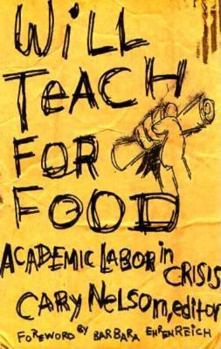Will Teach for Food: Academic Labor in Crisis Volume 12
Select Format
Select Condition 
Book Overview
'Higher education is being restructured to suit the needs and myths of the so-called free market economy. 'Will Teach for Food' exposes the myths and reveals what people employed at all levels of... This description may be from another edition of this product.
Format:Paperback
Language:English
ISBN:0816630348
ISBN13:9780816630349
Release Date:April 1997
Publisher:University of Minnesota Press
Length:320 Pages
Weight:0.85 lbs.
Dimensions:0.7" x 5.4" x 8.5"
Customer Reviews
2 ratings
Great
Published by Thriftbooks.com User , 20 years ago
Will Teach For Food began as Social Text 49's "Yale Strike Dossier," which in turn grew out of a conference held at Yale to discuss the ramifications of the '95-'96 grade strike and the role of tenured faculty in persecuting advisees for union activity. Despite the omission of several key essays about the grade strike (Cynthia Young's "On Strike at Yale" from Minnesota Review 45 & 46, Corey Robin's "Blacklisted and Blue," (which may have been written after WTFF was published) and similar work by Gordon Lafer which appeared in Dissent, this first half or so of the book is indispensable. John Wilhelm's "Short History Of Unionization at Yale" provides a good framework for looking at the history of workers' struggles against taylorization and union-busting since the organization of maintenance and grounds workers in the late 1930s. Corey Robin and Michelle Stephens provide a solid account of the difficulties of organizing contingent academic workers, while Michael Berube takes yale's elite faculty to task for sabotaging students' academic careers and threatening them with deportation of union activity. Kathy M. Newman provides an insightful and funny analysis of the cultural meanings of and anxieties embodied in representations of graduate students in popular culture, also looking at the ways in which GESO negotiated these images and tropes in the early days of its organizing and at the tropes and images employed and mobilized by anti-union undergraduates to express their own particular anxieties regarding the prospect of TA unionization. The seconf half of the book takes a more structural look at graduate student unionization as a national movement and is a worthwhile companion piece to both the first half of the book, as well as to other volumes following a similar route.
Lux et veritas revisited
Published by Thriftbooks.com User , 27 years ago
A certain elite university boasts (literally) an endowment of $5.7 billion (yes, billion with a B)--or did as of Tuesday, 16 September; you should add a million or two per day to get the approximate sum on the day you read this. On that same date the university announced that it will embark on a $1 billion (with a B) program to renovate the buildings on its campus. Yet just eighteen months ago, this same anonymous university--by far the biggest employer in one of the most economically depressed cities in the nation--engaged in a no-holds-barred campaign to break the two unions that represent its nonacademic labor force. And just before that, the university crushed the latest effort by the graduate students' union, which was seeking, before anything else, simply to get the university to admit the self-evident truth that teaching assistants are employees and that, as such, they have the right to bargain collectively. This institution fosters an extreme but not atypical example of the condition described in this book's subtitle. The academic labor force in the United States, from the celebrated professor to the undervalued custodian, faces an unprecedented crisis, a crisis deftly delineated in the seventeen essays of this book, roughly half of which focus on the labor struggles at the above-unnamed (but named in the book) elite university. That struggle brought support from labor's allies nationwide, but in the end it did little to change the workers' status from what frighteningly parallels--as Stephen Watt puts it in the book's most poignant metaphor--that of miners trapped in a "company town," where the perverted law of supply and demand means that the company supplies the work, so the company can demand whatever conditions are to its liking. The book does not pretend to bipartisanship, and at times polemic detracts from persuasiveness. But the best of the essays--like Watt's, Kathy Newman's, and particularly Michael Bérubé's--back up their rousing calls to collective action with coolly logical evidence and solidly ordered argument. This is an important book for anyone who is concerned with the state of labor and/or higher education; these days, who can afford not to be?






